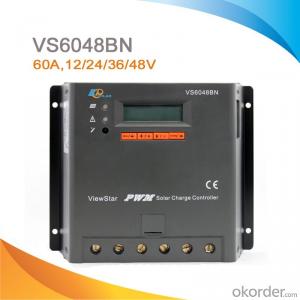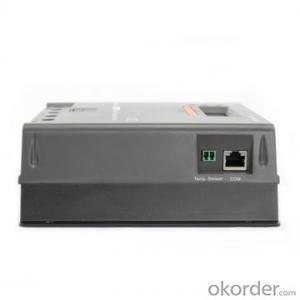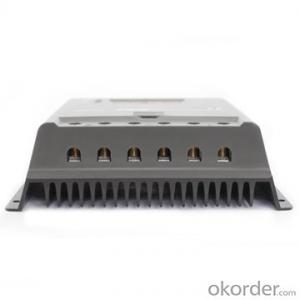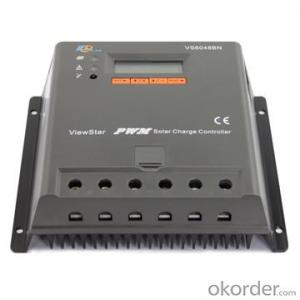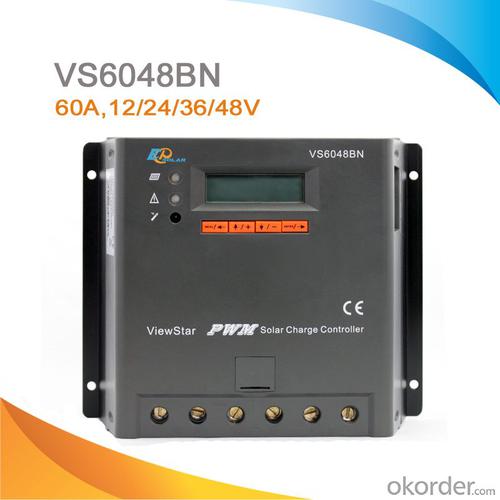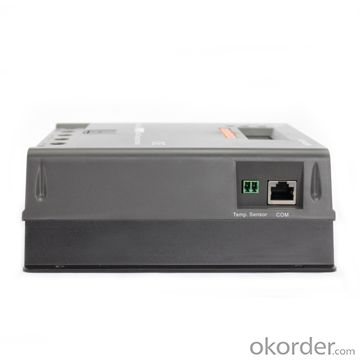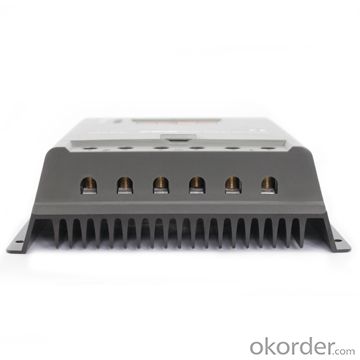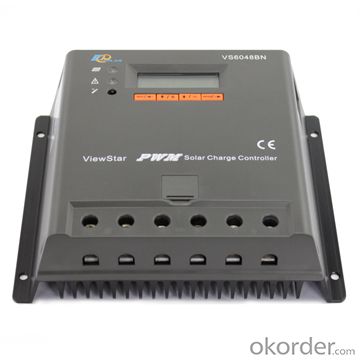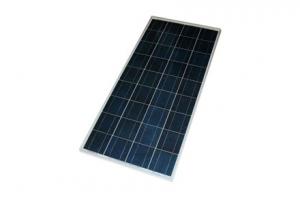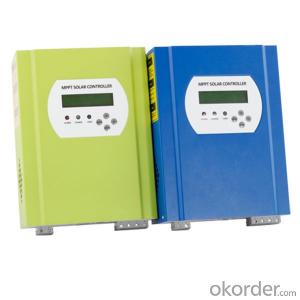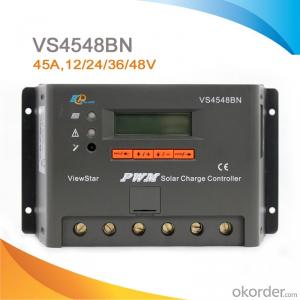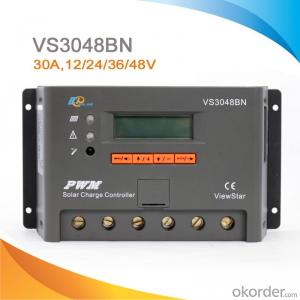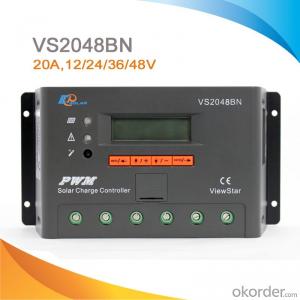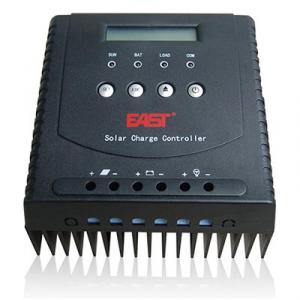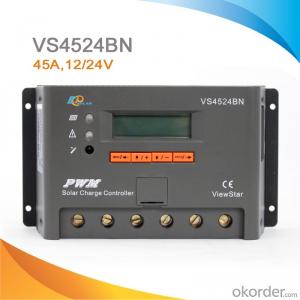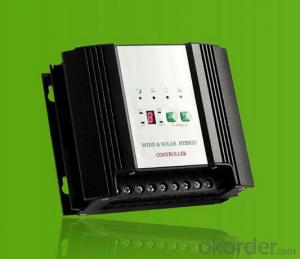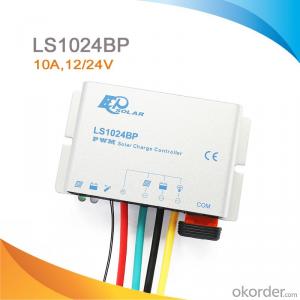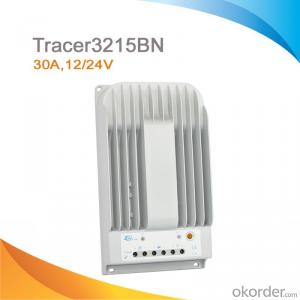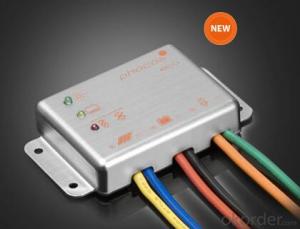Solar Controllers 10a LCD Display PWM Solar Charge Controller /Regulator 60A 12/24/36/48V, VS6048BN
- Loading Port:
- Tianjin
- Payment Terms:
- TT or LC
- Min Order Qty:
- -
- Supply Capability:
- 10000 pc/month
OKorder Service Pledge
OKorder Financial Service
You Might Also Like
Features:
·Excellent EMC design
·32 bit MCU with high speed
·High efficient Series PWM charging
·Four battery type options: Sealed, Gel, Flooded, and USER
·Intelligent lighting and timer control for solar lighting system
·12 bit A/D high-precision sampling to ensure accuracy
·Use MOSFET as electronic switch
·Full control parameters setting and modification, diversified load control mode
·Humanized design of browser interface, undertake every operating conveniently
·Temperature compensation
·Adopt graphics dot-matrix LCD screen and HMI (human-machine interface) with 4 buttons,integrated menu displaying and operation
·Energy statistics function
·RS485 ports with MODBUS communication protocol
·Optional PC monitoring software and remote meter for real-time monitoring and battery management parameter setting
·Field upgradable firmware
Electronic Protections:
·PV short circuit protection
·PV reverse polarity protection
·Battery overcharge protection
·Battery over discharge protection
·Battery reverse polarity protection
·Load overload protection
·Load short circuit protection
·Overheating protection
Specification:
Nominal system voltage | 12/24/36/48V auto work | |||
Rated battery current | 20A | 30A | 45A | 60A |
Rated load current | 20A | 30A | 45A | 60A |
Max. battery voltage | 64V | |||
Equalize charging voltage | Sealed: 14.6V, Flooded: 14.8V, User-defined: 9~17V | |||
Boost charging voltage | Gel: 14.2V, Sealed: 14.6V, Flooded: 14.8V, User-defined: 9~17V | |||
Float charging voltage | Gel /Sealed /Flooded: 13.8V, User-defined: 9~17V | |||
Low voltage reconnect voltage | Gel /Sealed /Flooded: 12.6V, User-defined: 9~17V | |||
Low voltage disconnect voltage | Gel /Sealed /Flooded: 11.1V, User-defined: 9~17V | |||
Self-consumption | ≤15mA(12V); ≤10mA(24V); ≤9mA(36V); ≤8mA(48V) | |||
Grounding | Common negative | |||
Temp. compensation | -3mV/°C/2V | |||
Relative humidity | 10%~90% Non-condensation | |||
Communication | RS485 / RJ45 interface | |||
LCD temperature | -20°C ~ +70°C | |||
Working temperature | -25°C ~ +55°C | |||
Humidity | ≤95% N.C. | |||
Enclosure | IP30 | |||
Overall dimension | 200x103x58mm | 201x109x59mm | 205x119x67mm | 205x174x64mm |
Terminals | 16mm2 | 35mm2 | 35mm2 | 35mm2 |
Net weight | 0.7kg | 0.9kg | 1.2kg | 1.5kg |
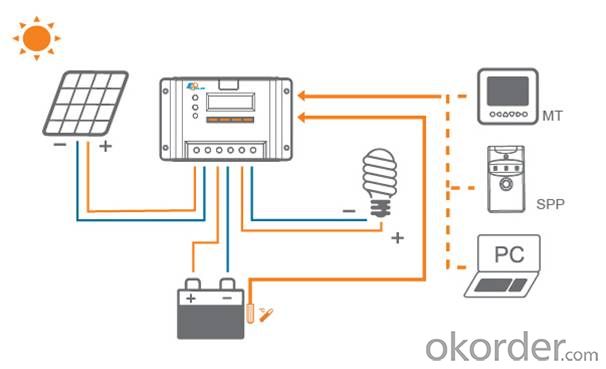
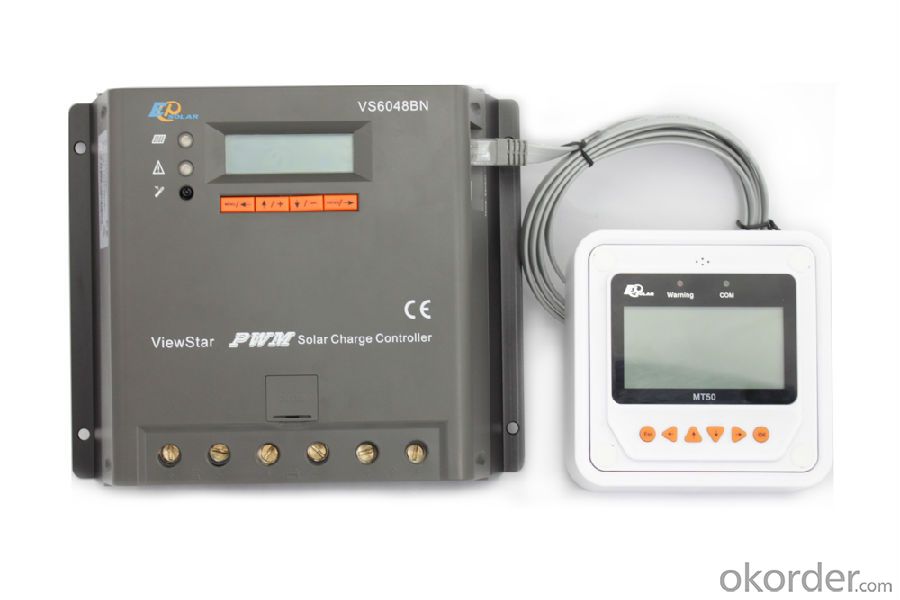
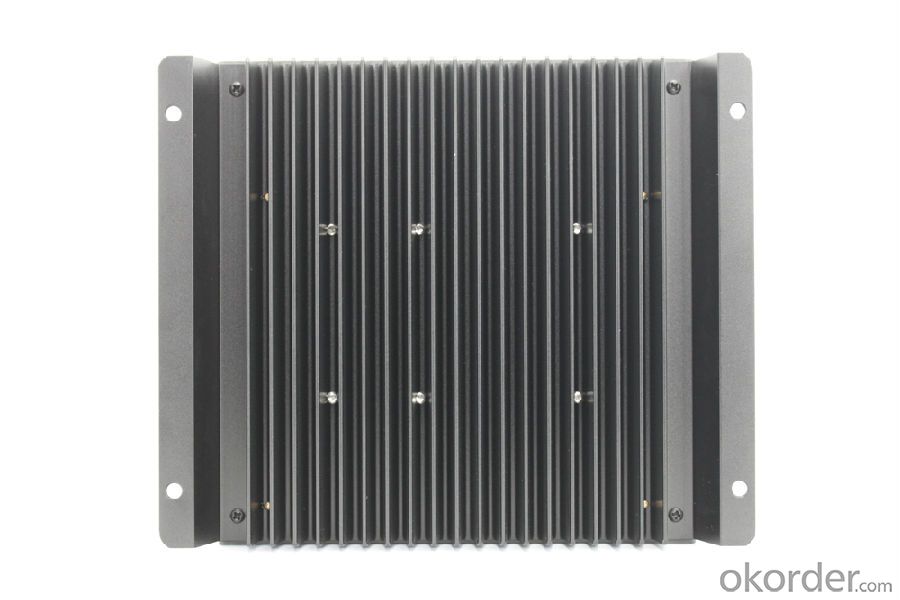
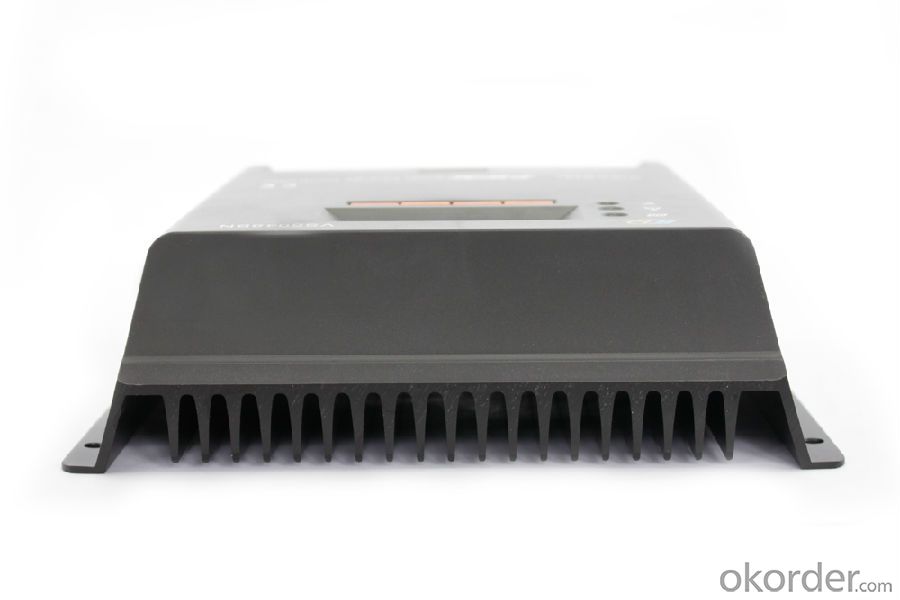
FAQ:
Q1. What is the voltage?
A1. Our 45/60A solar charge controller is 12/24/36/48V auto work.
Q2. What is the difference between MPPT&PWM?
A2. MPPT has higher efficiency, it can track the max power point and won't waste energy.
Q3. What is the efficiency of the MPPT controller?
A3. MPPT>99%, peak conversion efficiency>98%.
Q4. What is the waranty of product?
A4. 12 months.
- Q: How does a solar controller prevent damage from reverse current flow?
- A solar controller prevents damage from reverse current flow by incorporating a diode in its circuitry. This diode acts as a one-way valve, allowing current to flow from the solar panels to the battery, but not in the opposite direction. Thus, it ensures that the current generated by the battery does not flow back into the solar panels, preventing any potential damage or overcharging.
- Q: Can a solar controller be used in a solar-powered satellite system?
- Yes, a solar controller can be used in a solar-powered satellite system. The solar controller helps regulate and optimize the charging and discharging of the satellite's batteries, ensuring efficient use of the solar power generated by the satellite's solar panels. It protects the batteries from overcharging and helps maximize the lifespan of the batteries in the satellite system.
- Q: Can a solar controller be used with different types of solar tracking systems?
- Yes, a solar controller can be used with different types of solar tracking systems. A solar controller is responsible for managing the charge and discharge of batteries in a solar power system, as well as regulating the power flow between the solar panels and the batteries. It ensures that the solar panels are operating at their optimal efficiency and the batteries are being charged correctly. Solar tracking systems are designed to orient solar panels towards the sun, maximizing their exposure and energy generation. There are different types of solar tracking systems, such as single-axis and dual-axis trackers, which vary in their ability to track the sun's movement. A solar controller can be integrated with any type of solar tracking system as long as it is compatible with the system's specifications and requirements. It needs to be able to communicate and receive input from the tracking system to adjust the solar panel's orientation accordingly. Additionally, the solar controller should have the capability to handle the increased power output and fluctuations that may occur due to the movement of the solar panels. By using a solar controller with a tracking system, the overall efficiency and performance of the solar power system can be enhanced. The controller ensures that the batteries are being charged properly, preventing overcharging or undercharging, while also optimizing the power flow between the solar panels and the batteries.
- Q: Can a solar controller be used with thin-film solar panels?
- Yes, a solar controller can be used with thin-film solar panels. Solar controllers are designed to regulate and manage the charging process of solar panels, regardless of the type of panel technology being used. Therefore, they can effectively control the charging and prevent overcharging of thin-film solar panels, ensuring optimal performance and longevity.
- Q: Can a solar controller be used with solar panel bird deterrent systems?
- Yes, a solar controller can be used with solar panel bird deterrent systems. A solar controller helps regulate and control the flow of electricity from the solar panels to the bird deterrent system. It ensures that the solar panels are charging the system's batteries efficiently and protects against overcharging or damage to the batteries. So, a solar controller is an important component in ensuring the proper functioning and longevity of the solar panel bird deterrent system.
- Q: Can a solar controller be used with a solar-powered boat or RV?
- Yes, a solar controller can be used with a solar-powered boat or RV. A solar controller regulates the amount of power going into the battery, preventing overcharging and optimizing the charging process. This is crucial for maintaining the battery's health and maximizing the efficiency of the solar system.
- Q: Can a solar controller be used in a solar-powered electric airplane system?
- Yes, a solar controller can be used in a solar-powered electric airplane system. A solar controller is responsible for regulating the voltage and current from solar panels, ensuring efficient charging of batteries and protecting them from overcharging or discharging. In a solar-powered electric airplane system, the solar controller would play a crucial role in managing the power generated by the solar panels and ensuring optimal performance and safety of the system.
- Q: How does a solar controller handle low-light conditions?
- A solar controller is designed to regulate the charging process of a solar panel system, ensuring that the batteries are charged efficiently and preventing overcharging or damage. In low-light conditions, when there is less sunlight available, a solar controller adjusts the charging parameters to optimize the charging process and maintain the battery health. Typically, a solar controller employs a Maximum Power Point Tracking (MPPT) algorithm to maximize the power output from the solar panel under varying light conditions. This advanced algorithm continuously tracks the panel's maximum power point, adjusting the voltage and current to match the battery's requirements. During low-light conditions, the solar controller detects the decrease in solar irradiance and adjusts the charging parameters accordingly. It reduces the charging voltage to prevent overcharging and ensures that the battery is not undercharged by delivering the appropriate charging current. Moreover, some advanced solar controllers may also have a Low-Light Load Disconnect (LLLD) feature. This feature allows the controller to disconnect the load when the solar panel output drops below a certain threshold, preventing the battery from discharging excessively in low-light conditions. It helps to preserve the battery capacity and extend its lifespan. Overall, a solar controller is designed to adapt to varying light conditions and optimize the charging process accordingly. By adjusting the voltage, current, and load disconnect features, it ensures the battery is charged efficiently, even in low-light conditions, maximizing the system's performance and longevity.
- Q: Can a solar controller be used with solar-powered disaster response equipment?
- Yes, a solar controller can be used with solar-powered disaster response equipment. A solar controller is essential in regulating and optimizing the charging process of solar panels, ensuring that the equipment's batteries receive the right amount of power and preventing overcharging or damage. By using a solar controller, disaster response equipment can effectively harness solar energy and operate efficiently during critical situations.
- Q: What is the purpose of the battery over-discharge protection feature on a solar controller?
- The purpose of the battery over-discharge protection feature on a solar controller is to prevent the battery from being discharged beyond a safe level. This feature helps to prolong the battery's lifespan and ensures that it remains in a healthy condition for optimal performance.
Send your message to us
Solar Controllers 10a LCD Display PWM Solar Charge Controller /Regulator 60A 12/24/36/48V, VS6048BN
- Loading Port:
- Tianjin
- Payment Terms:
- TT or LC
- Min Order Qty:
- -
- Supply Capability:
- 10000 pc/month
OKorder Service Pledge
OKorder Financial Service
Similar products
Hot products
Hot Searches
Related keywords
